- NLI Research Institute >
- Financial and foreign exchange >
- The New Bank of Japan Law -Moving Toward Greater Central Bank Independence-
The New Bank of Japan Law -Moving Toward Greater Central Bank Independence-
Tomohiko Takahashi
Font size
- S
- M
- L
The new Bank of Japan Law, passed in the Upper House plenary session on June 11, 1997, becomes effective in April 1998. It is the first revision in over half a century of the BOJ Law of 1942, which has relegated the central bank to government control. The new law strengthens the central bank's autonomy and provides for greater transparency. This paper examines the background to the revision, the significant points of the revision, and unresolved issues. Also, in light of the new law's emphasis on autonomy, we apply a "central bank independence index" to evaluate the law's impact.
1. Background of the Revision
(1) Importance of Both Domestic and Foreign Factors
Both domestic and foreign background factors played a part in the revision−the domestic debate over financial reform, and the influence of central bank reforms in Europe.
When the Hashimoto government came to power in early 1996, the lingering aftereffects of the collapsed bubble economy painfully pointed to the inefficacy of Japan's postwar "convoy administration," bringing the issue of thorough financial system reform to the fore. In debating how to reform the Ministry of Finance, proposals surfaced to revise the Bank of Japan Law.
The revision attempt's progress can also be attributed to the central bank reforms occurring in Europe, particularly the legal revisions aimed at increasing central bank autonomy. Let us first look at the developments in Japan.
As Table 1 shows, several attempts were made in the postwar period to revise the BOJ law with the primary intention of increasing the central bank's autonomy. The last revision was triggered by the financial reform movement, specifically with a separate problem under the present law concerning the ambiguous basis for the BOJ's involvement in the financial system.
(2) Past Revision Attempts Through the 1960s
The basic cause behind these attempts is exemplified by Article 1 of the present BOJ law stating that the central bank's objective is to operate "pursuant to the national policy, in order that general economic activities of the nation might adequately be enhanced." The law, promulgated in 1942 as part of Japan's war mobilization, was heavily influenced by the Reichsbank Law of Nazi Germany, which imposed unconditional government authority over the central bank after it contested the government's expansionary policies. The influence is evident in sections describing the law's objective, general oversight authority by the minister of finance, and ambiguous stipulations regarding loans to the government.
In the postwar period, efforts were made to enhance the central bank's severely restricted autonomy, such as the establishment of the Policy Committee as a democratic decision making body in 1949. When Germany revised its central bank law in July 1957, interest in reform also arose in Japan. The Financial System Research Council looked into the government's general oversight authority and other issues but could not reach a consensus, while conflicting proposals presented by the government and BOJ brought reform efforts to a halt.
When Japan became an IMF Article 8 nation in 1964 and promised not to use current account deficits as a reason to control exchange rates, the BOJ governor's testimony in the Upper House rekindled the debate over reform but did not lead to any change.
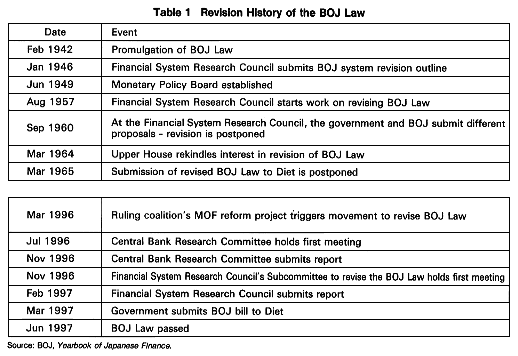
(3) Events Leading to the Revision
The impetus to the latest revision came from the revelation of the jusen housing loan crisis and other financial scandals, which raised financial reform to an imperative, as well as from the worldwide trend in central bank reform. Discussion of the problems of the present law shifted from being a project of the coalition parties to the Central Bank Research Committee, an advisory organ to the prime minister, and the Financial System Research Council, an advisory group to the minister of finance. Specifically, the direction of revisions was determined regarding: (1) the nationalistic tint of the bank's objective; (2) autonomy (the governor's weak position, the government's general oversight authority, etc.); (3) transparency (accountability, etc.); (4) ambiguity in policies for supervising banks; and (5) ambiguity in stipulations for providing credit to the government. Following the Financial System Research Council's r eport, the revision bill was pres ented to the National Diet in March 1997. Over strong opposition from the opposition parties, who presented a separate bill and attached riders to restructure the BOJ and limit rehiring of BOJ employees, the half-century old law was finally revised.
(4) Key Points of the Revision
The numerous revisions can be classified into the following categories: the central bank's objectives, autonomy, transparency and accountability, and prudence (maintaining the financial system).
- Policy objectives
- The law states that the Bank of Japan's objective is to pursue price stability by carrying out currency and monetary control and maintaining an orderly financial system.
- Autonomy
- The minister of finance's authority to issue orders regarding the bank's general business is abolished.
- The dismissal of executives based on differences of opinion on policy is prohibited.
- The Policy Board has been reorganized. Industry representatives are abolished, and the Board consists off nine members a governor, two deputy governors, and six deliberative members. However, Board meetings may be attended by two government representatives who cannot vote but can present proposals and request the postponement of voting.
- Transparency and accountability
- The BOJ must prepare and publish documents containing the minutes and outline of discussions of board meetings. In addition, the BOJ must report to the Diet every six months regarding Board decisions and conditions of business operations.
- Prudence
- Stipulations regarding the BOJ's on-site examination of banks are clarified.
- Specific stipulations are made regarding the provision of loans for the maintenance of an orderly financial system.
2. Central Bank Reform in Europe
(1) The U.K.
The second background factor that influenced the revision of the BOJ Law has been the movement in Europe to strengthen the autonomy of central banks.
At the time the BOJ bill was under debate in the Diet, the Labour Party regained power in the U.K. after 18 years. Even before the euphoria over Blair's Labour victory had subsided, incoming Chancellor Gordon Brown sent a letter to Bank of England Governor Eddie George describing a new monetary policy framework and ceding control over interest rates to the Bank. On June 6 the Bank's Monetary Policy Committee exercised its new power by raising base lending rates by 0.25 percent to 6.50 percent.
(2) Establishment of the European Central Bank
In the backdrop to the reforms in the U.K. are the establishment of the Economic and Monetary Union (EMU) and European Central Bank (ECB).
The EMU will create a single currency called the euro in January 1999, and establish a system of central banks (ESCB). The new European Central Bank (ECB) will conduct a single monetary policy whose final objective is price stability, and its policy will be carried out by the present central banks in each country. By that time, each central bank will have had to fulfill conditions regarding institutional, personnel, functional, and financial autonomy.
Like the U.K., Sweden is also initially staying out of the EMU while strengthening the autonomy of its central bank. Its reforms conform with the legislative changes necessary in transforming the European Monetary Institute (EMI) into the ECB. Indeed, Sweden and the U.K. both seem to be highly aware of and inclined toward conformance to the ESCB.
Europe's movement toward stronger central bank autonomy has influenced not only Japan but many other countries as well.
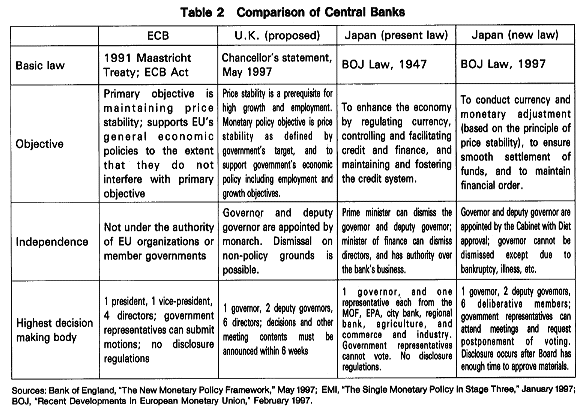
3. Backdrop to Stronger Central Bank Autonomy
Outside of Europe, central bank reforms are occurring in different parts of the world including Canada, Japan and Korea. These reforms share the following background causes.
(1) Policy Coordination After the Plaza Accord
First is the recognition that since the Plaza Accord in September 1985, efforts to coordinate monetary policy particularly among G7 countries took undue priority over domestic considerations.
Two examples of this: (1) following Black Monday, the Bundesbank broke away from the concerted policy action in December 1987 by reducing interest rates; (2) after the Bundesbank's rate hike in July 1988, the BOJ postponed raising its record low discount rate until May 1989 in consideration of exchange rates, contributing to the bubble economy.
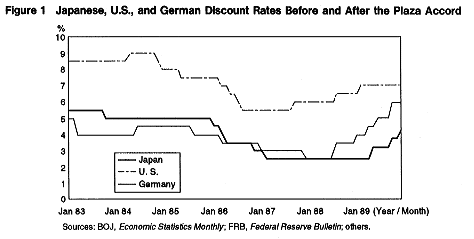
(2) Global Standardization
Second, as global financial markets have become more mutually interdependent, central banks have come to acquire common global standards.
Today, interest rates in one country can easily influence those in others due to arbitration. In addition, with technological advances enabling instantaneous, worldwide transactions of sophisticated products such as derivatives, regulated markets have lost business to markets in other countries.
These developments have forced countries to liberalize their financial markets in conformance with global standards. Since liberalization entails a greater flow of funds across borders, the power of central banks has had to be enhanced to meet common global standards.
The global standards by which central banks can obtain the trust of domestic and foreign financial markets are as follows: define the objectives of monetary policy, become independent of the government in policy making, and not provide loans to the government. In other words, central banks are becoming more autonomous.
(3) Reduced Confidence in Money Supply Statistics
Financial liberalization since the late 1980s and the flow of assets into new financial products have destabilized the relationship between the real economy and money supply growth, a key medium-term monetary policy target used by central banks. The lack of guidelines for monetary policy has encouraged political interference.
As monetarists claim, if there is a stable relationship between the money supply and price level, implementation of the k-percent rule (targeting money supply growth at k-percent) should lead to price stability, the ultimate objective of monetary policy. In practice, however, not only is it difficult to control the money supply, but achieving the medium-term growth target would still not ensure price stability due to the unstable relationship with the money supply.
Since mechanically set money supply growth targets have become outmoded, opportunities have increased for political interference. To earn the confidence of financial markets, central banks must become independent in policy making, and prevent policy distortions caused by political interference.
4. Significance of the Revised BOJ Law
While not all issues have been resolved by the new law, it can be commended for increasing the Bank's autonomy and transparency
(1) Increased Autonomy
The most significant aspect of the new law is that it gives the Bank greater autonomy.
The governor's position has been strengthened in that he cannot be dismissed except for illness or similar reasons. In addition, since the minister of finance no longer has the power of general oversight, the Bank is far more institutionally independent that under the current law.
Policy making has been made independent from the government by strengthening the Monetary Policy Board. The composition of the board, which used to have seven members (the governor, two government representatives, and four industry representatives), has been changed to nine members (the governor, two deputy governors, and six deliberative members appointed by the Cabinet; elimination of the industry representatives should enliven meetings). The government representatives can still make proposals and request that voting be postponed, but cannot actually vote. Two-thirds of the members are needed to form a quorum, and decisions are made by majority rule.
Since the late 1980s, analysts have sought to measure the level of independence of central banks by devising a "central bank independence index."
Methods vary depending on the criteria of independence being emphasized. One type of index measures the independence of monetary authorities from the government, while another type emphasizes monetary stability.
Exemplifying the former approach are Cukierman, Webb and Neyapti, who attempt to measure central bank independence from several directions−legal independence, turnover rate of governors, questionnaire responses of specialists, and an aggregation of the first two. They rank each country's central bank charter based on legal characteristics they expect will lead to greater autonomy to pursue price stability: CEO appointment and dismissal, policy formulation, central bank objectives, and limitations on lending to the government. Their finding, which our own analysis supports, is that industrial countries with high central bank legal independence generally have greater price stability, suggesting that legal independence enhances the power of central banks to control inflation.
The present BOJ Law produced a score of 0.18, the lowest among the countries measured. When we used the same method to evaluate the new BOJ Law, the index rose to 0.37 due to improved policy objectives (Figure 2). Of course, this text-based approach is not without its limitations. Moreover, the index is not defined absolutely, and should be regarded as an indicator of direction rather than magnitude.
Still, the legal independence index supports the view that the new BOJ Law will increase the central bank's independence institutionally and in policy formulation.
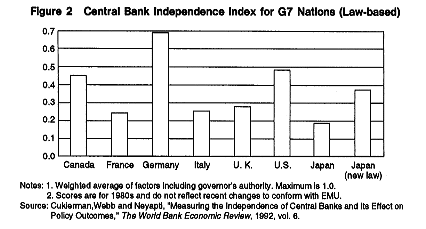
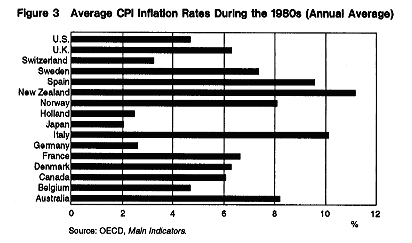
(2) Clarification of Objectives
As discussed earlier, the objectives stated in the present BOJ Law bear the overtones of the law's militaristic origin. The new law clarifies the Bank's responsibility on price stability: "Currency and monetary control shall be aimed at, through the pursuit of price stability, contributing to the sound development of the national economy."
The experience of rampant inflation following the two oil shocks has made price stability the top priority of monetary authorities around the world. Moreover, reflecting on the massive asset price inflation of the late 1980s, the Financial System Research Council warned against excessively focusing on overall price stability. As for a proposal to replace price stability with stability of currency value, it was apparently ruled out because of the possibility of conflict between exchange rate and price stability targets.
(3) Ensuring Transparency
Due partly to the era in which it was drafted, the present law does not require the Monetary Policy Board to be accountable and explain its decisions.
Policy-making transparency under the new law will go beyond the governor's present practice of holding regular news conferences, and require that the governor report to the Diet every six months, and that the Board publicize its meeting outlines and minutes.
(4) Enhanced Money Market Operations
Since the new law grants the Board with "money market control through various measures such as buying and selling of bills or bonds," the Board will be deciding such matters as whether to induce call rates lower
In addition, a new function added to the Bank's regular business is "making loans against collateral in the form of bills or notes, government bonds and obligations, and other negotiable securities." This provides a legal basis for the BOJ's operations in the bond repo market, which has recently been expanding remarkably.
These changes will strengthen the BOJ's money market perations.
(5) Clarification of Involvement in Banking Supervision
Article 1 of the new law states that the Bank will continue to be responsible for maintaining the financial system: "the Bank's objective is to ensure smooth settlement of funds among banks and other financial institutions, thereby contributing to the maintenance of an orderly financial system."
Under the present law, examinations and special loans are conducted under a broad interpretation of Article 25, allows the bank to "undertake such businesses as are necessary for the maintenance and fostering of the credit system." Stipulations written in the new law provide a clearer basis for involvement in banking supervision.
5. Unresolved Issues, Future Prospects
As we have seen, the new law resolves many of the problems encountered under the present law. However, several issues remain to be adequately addressed.
(1) Incomplete Independence
An important aspect of central bank independence regards loans issued to the government. Although substantial and wide ranging improvements are made to the present law, the new law's provision for underwriting FB (financing bills, which are short-term government securities) leaves intact the present ambiguous stipulations regarding loans to the government. The government must show moderation on this point. As will be explained below, this issue also hinders the development of short-term financial markets.
In addition, while the government representatives do not have voting rights, they can request the postponement of a vote.
By comparison, the general practice in other countries is for public subscription of short-term government securities. As for the right of government representatives to postpone voting, the Bundesbank plans to abolish a similar provision because the EMU has advised that it hinders central bank independence. The new BOJ Law thus runs contrary to the worldwide trend and diverges from the global standard.
In addition, since current budget expenditures are to be contained so as not to hamper currency and monetary control, the need to seek government approval for expenditures also poses a problem of independence.
(2) Compatibility of Monetary Policy with Banking Supervision
The revised law clarifies BOJ involvement in banking supervision. While examination stipulations have clarified the BOJ's responsibility as a bank supervisor, the status of its derivative function of supervising banks endangers its credibility to conduct its essential function of monetary policy. In addition, there is concern that in knowing of and being responsible for the business condition of financial institutions, the BOJ may have greater difficulty in tightening monetary policy.
The issuance of special loans, vaguely stipulated under Article 25 of the present law as a business necessary to maintain and develop the financial system, has been clarified in Article 38 of the new law by designating the BOJ as a lender of last resort. In the short term, many problems remain unresolved, such as how to issue special loans without harming the BOJ's own financial soundness. In particular, the lack of limits on special loans could lead to an expansion of money supply, worsen the BOJ's financial condition, and damage the BOJ's credibility to pursue its primary objective of price stability.
(3) Responsiveness to the Japanese Big Bang
With the enactment in April 1998 of both the revised BOJ Law and Foreign Exchange and Trade Law, the response to financial markets will become increasingly important. Amid concern that increased trans-border fund flows will destabilize exchange rates, maintaining the yen's value will not be an objective of the BOJ. Given the government's relationship with the global financial system, foreign currency intervention will be conducted solely by the government.
This outcome probably came from the consideration that by intervening, the BOJ could lose asset soundness. But it when a speedy response is needed, it remains to be seen whether the BOJ can perform interventions well despite having no say in the decision.
FB's (financing bills) such as foreign currency fund securities, which are also used as foreign currency reserves for intervention, are underwritten by the BOJ at below-market interest rates to support government finances. Considering that the outstanding amount is sustained and can exceed ¥30 trillion, a similar problem arises as with underwriting government securities.
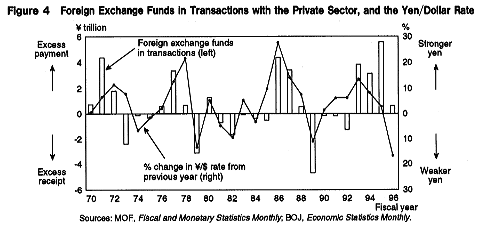
Moreover, to put the revised law within the context of the Japanese Big Bang, the expected growth in international fund flows will render the interbank call and bill markets unsuitable as ordinary receptacles for yen funds flowing back into Japan. CD (certificate of deposit) and CP (commercial paper) markets also have problems with respect to uniformity and credit risk. Since the BA (bank acceptance) market has not grown in Japan's short-term financial market, uniform products that have high credibility are indispensable. One candidate is discounted short-term government securities (treasury bills, or TB), but the market size is insufficient. Thus the FB market, which exceeded ¥30 trillion as of the end of fiscal 1996, needs to be reevaluated from this aspect. Needless to say, the price of FB's would then need to be determined by public subscription.
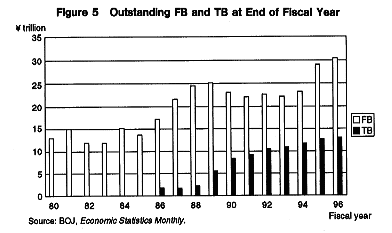
In a June 18 news conference following passage of the new BOJ Law, Governor Matsushita confirmed that this problem had been discussed from the early stages of the bill's preparation, and that the BOJ and MOF had set up a working group to study the problem.
(4) Prospects
Greater legal independence and transparency of the central bank improve its credibility and hence contribute to price stability. However, many pending issues depend on actual operations. Whether the BOJ can demonstrate its independence will focus on actual operations such as the selection and management of members of the Monetary Policy Board, and on the response to political interference.
For central banks, absolute ideals do not exist, policy measures are susceptible to prevailing macroeconomic theories, and the content of independence also changes. The new law began as an attempt to improve banking supervision, and while it attempts to approach an ideal, the lack of a firm vision produces an undeniable sense of struggle. For example, the preservation of loans to the government and the ability of government representatives on the Board to request postponement of voting are two conditions that clearly diverge from the global standard.
The new law comes into effect in April 1998. As the Big Bang unfolds and ushers in more electronic transactions and sophisticated financial derivatives, financial markets and institutions are bound to change. Considering the accelerating pace of change, the issues left pending by the new law will become problems relatively quickly, producing opportunities for reevaluation in some cases.
The BOJ needs to improve its operations under the new law by increasing its independence and transparency to earn the trust of financial markets and the general public. In doing so, if changes in markets and players occur that cannot be fully dealt with by the Bank's operations, the Bank needs to adopt a flexible and proactive role in effecting the necessary changes.
Tomohiko Takahashi
Research field
Social media account
レポート紹介
-
研究領域
-
経済
-
金融・為替
-
資産運用・資産形成
-
年金
-
社会保障制度
-
保険
-
不動産
-
経営・ビジネス
-
暮らし
-
ジェロントロジー(高齢社会総合研究)
-
医療・介護・健康・ヘルスケア
-
政策提言
-
-
注目テーマ・キーワード
-
統計・指標・重要イベント
-
媒体
- アクセスランキング

















